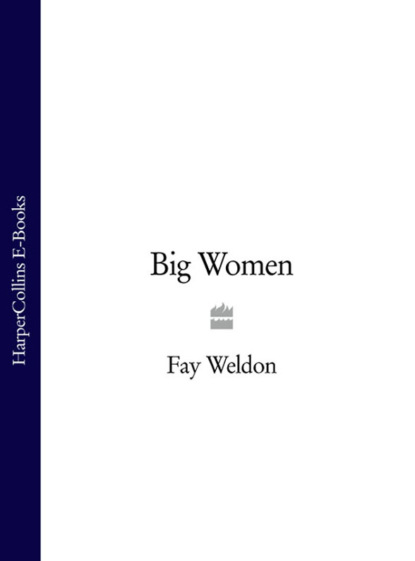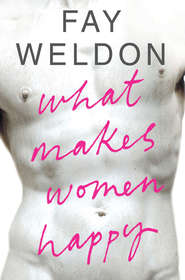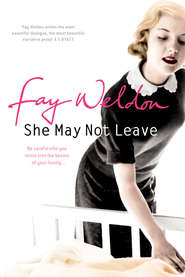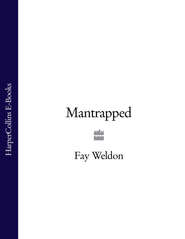По всем вопросам обращайтесь на: info@litportal.ru
(©) 2003-2024.
✖
Big Women
Автор
Год написания книги
2018
Настройки чтения
Размер шрифта
Высота строк
Поля
Big Women
Fay Weldon
This is the story of women when they were wimmin: of that blossoming in seventies England of hope, freedom, equality and sisterhood; and of what happened next…Big Women is the tale of Medusa, a feminist publishing house founded one balmy evening at sedate Chalcot Crescent in a flurry of argument, peace-making and naked dancing.The novel is everything and more we expect from Fay Weldon, not just a work of literature but an energising drop into the pool of social complacency – a feisty, no-holds-barred portrait of four women’s attempts and failures to create a new life. There’s Layla, noisy, darlingish, high-profile. Alice, the academic, the philosopher, the – eventually – Glastonbury witch. Nancy: boring, sensible Nancy, the only one with any business nous. And Stephanie, the one who leaves her husband and children to embrace politics, men, other women… Their stories are intertwined with twenty years of all our lives – blissful, rage-filled, treacherous, redemptive.
FAY WELDON
Big Women
Contents
Cover (#u8e01fe9c-9a4a-58df-b8c1-1e58f94ca4e9)
Title Page (#u45cbc65c-6135-50ab-baac-73dda4f4771f)
Part 1 (#u8ee18a10-eb5a-5e88-8fea-0ebee5b0b94e)
Will You, Won’t You? (#udda0061d-ea9a-509f-b7da-5f297b0a7621)
Part 2 (#litres_trial_promo)
A Nest of Randy Vipers (#litres_trial_promo)
Part 3 (#litres_trial_promo)
Saffron’s Search (#litres_trial_promo)
Part 4 (#litres_trial_promo)
Well, I’m sorry (#litres_trial_promo)
About the Author (#litres_trial_promo)
By the Same Author (#litres_trial_promo)
Copyright (#litres_trial_promo)
About the Publisher (#litres_trial_promo)
PART 1 (#ulink_8cb4a739-ac1e-5834-90e1-8cddc7feb9cf)
Will You, Won’t You? (#ulink_4062b131-6fca-5a64-b586-d7d747ca2b17)
Slap, slap, slurp: a hollow, juicy sound. Stephanie’s pasting up posters on the dark green wall of a Victorian urinal. The year’s 1971. This urinal still stands there at the bottom of Carnaby Street, alongside Liberty’s of London. See it now, as then. Stephanie is clearly not an expert at what’s called posting bills. Paste dribbles down all over the place: they go up crooked, they overlap. But up they go. The legend Bill Posters Will Be Prosecuted gets obscured, as another poster slips and slides.
‘Poor Bill Posters,’ says Layla.
Stephanie doesn’t get the joke. This is her life problem. Her life asset is her beauty. In 1971 she is twenty-five; she has perfect features, a lanky body, abundant blonde straight hair, and rather large hands and feet. Layla is twenty-six, shorter, plumper, funnier; she has curly dark hair. One side of Layla’s face does not line up with the other, so she is called sexy and attractive, but seldom beautiful. Layla does not regard this as a life problem. She has too much to think about.
The posters declare over and over, A Woman Needs a Man like a Fish Needs a Bicycle. People stare a moment and pass on. The message makes no sense. Obviously women need men. Everyone needs men. Masculinity is all. Armies need men, and government and business and technology and high finance. And teaching and medicine and adventuring and fashion. And all the serious arts. Offices, except for the typing pool, which is female, need men. It’s homes which need women, except for the lawn which is male. Women are for sex, motherhood and domesticity. Men are for status and action. Outside the home is high status, inside the home is low status. In popular myth men make decisions, women try on hats. The world is all id and precious little anima. Layla and Stephie, friends, mean to change all this. A Woman Needs a Man like a Fish Needs a Bicycle. Ho, ho, ho. Everyone knows women compete for male attention; isn’t this how the problem of female bitchery arises? Catty? Felines are nothing compared with women. Perhaps this puzzle poster is advertising something?
A couple of tourists, Brian and Nancy from New Zealand, emerge from the crowds in Carnaby Street. They have been rendered punch-drunk by colour, fabric, and the smell of patchouli. These are still flower-power and drug days. See feather boas, silk caftans, crushed velvet hats; lots of mauve, flares, miniskirts, platform heels; good-looking guys with lots of hair, girls with doll faces drifting behind them; wide eyes, fake lashes, white faces. Brian and Nancy both wear white Aertex shirts and tennis shoes for ease and comfort. Both are in culture shock. They flew in today from Wellington. (It took thirty-six hours.) They are accustomed to mountains, plains and sheep farms. Brian is gloriously handsome and golden. Nancy is pleasing enough to look at, but lacks eroticism: she’s tall, long-limbed, and manages to appear gawky rather than slender.
Brian is reading a newspaper headline. Oz Trial Verdict – the Bear’s Obscene. He has taken the paper from its stand but seems to have no intention of paying for it. The man who owns the kiosk lifts eyes to heaven. He is a relic of the old days. He has no nose. Leprosy ate it away. People avert their eyes but buy more papers.
‘Total filth,’ says Brian.
Nancy is staring at the poster, trying to make out its meaning. She senses that there is something mysterious and powerful here. Layla and Stephanie have finished with their bill-posting and now advance towards Brian and Nancy. Layla has a plank tucked under her arm. Nancy nudges Brian.
‘Is something the matter, Nancy?’ asks Brian, who has a man’s dislike of subtle hints.
‘Shouldn’t we get on to the Youth Hostel?’ asks Nancy.
‘They fill up early.’ She tries to draw him to one side but he resists.
‘Stop nagging,’ he says.
‘Sorry,’ she says. Women would say this to men automatically, far more frequently then than they do now.
‘Sex life of Rupert Bear,’ he says. ‘Getting school kids involved. Disgusting. And this Neville fellow is an antipodean. But this thing is worldwide, I reckon. A worldwide epidemic of permissiveness.’ He likes the sound of this. He repeats it.
‘Could we pass?’ asks Layla, politely, since Brian and his unbought newspaper bar their way. The noseless man smiles thinly under hideous nostrils.
‘Ladies say please,’ says Brian. At which Layla simply turns and swipes him to one side with the end of the plank, turns back, and she and Stephanie move on. Brian, knocked against the wall momentarily, recovers quickly.
‘Aggressive bitches,’ he says.
‘You were in their way, Brian,’ remarks Nancy, which makes Brian wonder exactly whose side she’s on.
‘They must be feminists,’ he observes.
‘How can you be sure?’ she asks.
‘They don’t even walk like proper women,’ he says.
And it’s true. All around Brian and Nancy doe-eyed and adoring women drift along in the shadow of men, stumbling on platforms, trit-trotting in stiletto heels. Layla and Stephanie stride; they wear jeans and T-shirts. Their equivalents today would be muscular and well exercised. Layla and Stephanie, for all their health, strength and energy, are soft-limbed, smooth-shouldered. Men have muscles: women have defencelessness as their weapon. No wonder this world is so erotic, super-charged: composed of polarities as it is. He, she. Hard, soft. Think, feel. Yin, yang. Nancy stares down at her laced canvas sandshoes, with their flat heels which seem to sink you into soil, and is suddenly dissatisfied with all things practical and sensible. Brian shoves the newspaper, badly folded, back into the kiosk rack. The newspaper seller snarls, all red gum and broken teeth and no nose. Brian does not even notice. But on the way past, he too stops and stares at the posters.
‘I don’t understand that,’ he says. ‘Is it some kind of stupid ad for something?’
‘I think it means women could exist without men,’ says Nancy.
‘But why would they want to?’ asks Brian. He’s genuinely puzzled. There will always be women waiting for Brian, with his powerful shoulders, bronzed skin and blue eyes gazing out at the white-topped, non-existent mountains. It is hard for any of us to get beyond our sample of one; namely, ourself.
Stephanie drives her little Mini home. Layla goes too. There is to be a consciousness-raising meeting at Stephanie’s house at No. 103 Chalcot Crescent. The drive takes only ten minutes. Traffic flow is half what it is now, and there are lots of parking places, even down the pretty, narrow, Georgian street which curves between Regent’s Park Road and Chalcot Square. In those days you could get a house in Chalcot Square for £30,000. Today, expect three-quarters of a million. So it goes. Everyone has a property story. Look right from the porched windows of No. 103 and see the green of Primrose Hill, look left to the double-fronted green and white curved house at the end of the Crescent, which was once a brothel. Ancient taxi drivers would report that years ago, in his youth, a royal scion would be wheeled by giggling girls up and down the Crescent in a pram, dressed in baby clothes. Whatever changed, except the status of certain roads in certain areas? Primrose Hill, now so salubrious, used to be known as the Coalblow, so much soot drifted over from the King’s Cross marshalling yards; here was the highest bronchitis rate in the entire Western world. Not that a man in a pram would suffer much, in the time it took to get to the end of the street and back. It would be worse for the girls who lived and worked there, but they were two a penny, then as now.
At this time the Crescent was a home for artists and Bohemians: the academics were moving in: soon it would be the bankers’ turn. Stephanie’s husband Hamish lived in the Crescent and owned an antique shop around the corner in Regent’s Park Road. He was an artist by talent and temperament, but made an allied living buying and selling the artefacts of the past. In those days few could tell a Victorian handsaw from an Edwardian fire-tong, oak from pine, or Roman glass from Woolworth’s. Now everyone knows.
As Layla and Stephanie unpacked the Mini they saw Zoe approach, pushing little Saffron in a buggy. She was crying: Zoe, that is to say, not Saffron. Zoe had a degree in sociology, and staying at home to look after her child depressed her. She found the company of children boring and her husband difficult. He was an engineer and talked mostly of bridges, and occasionally slapped Zoe, which was not the sin it nowadays is. And which she could have prevented had she really tried, but she enjoyed occupying the moral high ground.
‘Zoe,’ asked Stephanie, ‘what’s the matter?’
Fay Weldon
This is the story of women when they were wimmin: of that blossoming in seventies England of hope, freedom, equality and sisterhood; and of what happened next…Big Women is the tale of Medusa, a feminist publishing house founded one balmy evening at sedate Chalcot Crescent in a flurry of argument, peace-making and naked dancing.The novel is everything and more we expect from Fay Weldon, not just a work of literature but an energising drop into the pool of social complacency – a feisty, no-holds-barred portrait of four women’s attempts and failures to create a new life. There’s Layla, noisy, darlingish, high-profile. Alice, the academic, the philosopher, the – eventually – Glastonbury witch. Nancy: boring, sensible Nancy, the only one with any business nous. And Stephanie, the one who leaves her husband and children to embrace politics, men, other women… Their stories are intertwined with twenty years of all our lives – blissful, rage-filled, treacherous, redemptive.
FAY WELDON
Big Women
Contents
Cover (#u8e01fe9c-9a4a-58df-b8c1-1e58f94ca4e9)
Title Page (#u45cbc65c-6135-50ab-baac-73dda4f4771f)
Part 1 (#u8ee18a10-eb5a-5e88-8fea-0ebee5b0b94e)
Will You, Won’t You? (#udda0061d-ea9a-509f-b7da-5f297b0a7621)
Part 2 (#litres_trial_promo)
A Nest of Randy Vipers (#litres_trial_promo)
Part 3 (#litres_trial_promo)
Saffron’s Search (#litres_trial_promo)
Part 4 (#litres_trial_promo)
Well, I’m sorry (#litres_trial_promo)
About the Author (#litres_trial_promo)
By the Same Author (#litres_trial_promo)
Copyright (#litres_trial_promo)
About the Publisher (#litres_trial_promo)
PART 1 (#ulink_8cb4a739-ac1e-5834-90e1-8cddc7feb9cf)
Will You, Won’t You? (#ulink_4062b131-6fca-5a64-b586-d7d747ca2b17)
Slap, slap, slurp: a hollow, juicy sound. Stephanie’s pasting up posters on the dark green wall of a Victorian urinal. The year’s 1971. This urinal still stands there at the bottom of Carnaby Street, alongside Liberty’s of London. See it now, as then. Stephanie is clearly not an expert at what’s called posting bills. Paste dribbles down all over the place: they go up crooked, they overlap. But up they go. The legend Bill Posters Will Be Prosecuted gets obscured, as another poster slips and slides.
‘Poor Bill Posters,’ says Layla.
Stephanie doesn’t get the joke. This is her life problem. Her life asset is her beauty. In 1971 she is twenty-five; she has perfect features, a lanky body, abundant blonde straight hair, and rather large hands and feet. Layla is twenty-six, shorter, plumper, funnier; she has curly dark hair. One side of Layla’s face does not line up with the other, so she is called sexy and attractive, but seldom beautiful. Layla does not regard this as a life problem. She has too much to think about.
The posters declare over and over, A Woman Needs a Man like a Fish Needs a Bicycle. People stare a moment and pass on. The message makes no sense. Obviously women need men. Everyone needs men. Masculinity is all. Armies need men, and government and business and technology and high finance. And teaching and medicine and adventuring and fashion. And all the serious arts. Offices, except for the typing pool, which is female, need men. It’s homes which need women, except for the lawn which is male. Women are for sex, motherhood and domesticity. Men are for status and action. Outside the home is high status, inside the home is low status. In popular myth men make decisions, women try on hats. The world is all id and precious little anima. Layla and Stephie, friends, mean to change all this. A Woman Needs a Man like a Fish Needs a Bicycle. Ho, ho, ho. Everyone knows women compete for male attention; isn’t this how the problem of female bitchery arises? Catty? Felines are nothing compared with women. Perhaps this puzzle poster is advertising something?
A couple of tourists, Brian and Nancy from New Zealand, emerge from the crowds in Carnaby Street. They have been rendered punch-drunk by colour, fabric, and the smell of patchouli. These are still flower-power and drug days. See feather boas, silk caftans, crushed velvet hats; lots of mauve, flares, miniskirts, platform heels; good-looking guys with lots of hair, girls with doll faces drifting behind them; wide eyes, fake lashes, white faces. Brian and Nancy both wear white Aertex shirts and tennis shoes for ease and comfort. Both are in culture shock. They flew in today from Wellington. (It took thirty-six hours.) They are accustomed to mountains, plains and sheep farms. Brian is gloriously handsome and golden. Nancy is pleasing enough to look at, but lacks eroticism: she’s tall, long-limbed, and manages to appear gawky rather than slender.
Brian is reading a newspaper headline. Oz Trial Verdict – the Bear’s Obscene. He has taken the paper from its stand but seems to have no intention of paying for it. The man who owns the kiosk lifts eyes to heaven. He is a relic of the old days. He has no nose. Leprosy ate it away. People avert their eyes but buy more papers.
‘Total filth,’ says Brian.
Nancy is staring at the poster, trying to make out its meaning. She senses that there is something mysterious and powerful here. Layla and Stephanie have finished with their bill-posting and now advance towards Brian and Nancy. Layla has a plank tucked under her arm. Nancy nudges Brian.
‘Is something the matter, Nancy?’ asks Brian, who has a man’s dislike of subtle hints.
‘Shouldn’t we get on to the Youth Hostel?’ asks Nancy.
‘They fill up early.’ She tries to draw him to one side but he resists.
‘Stop nagging,’ he says.
‘Sorry,’ she says. Women would say this to men automatically, far more frequently then than they do now.
‘Sex life of Rupert Bear,’ he says. ‘Getting school kids involved. Disgusting. And this Neville fellow is an antipodean. But this thing is worldwide, I reckon. A worldwide epidemic of permissiveness.’ He likes the sound of this. He repeats it.
‘Could we pass?’ asks Layla, politely, since Brian and his unbought newspaper bar their way. The noseless man smiles thinly under hideous nostrils.
‘Ladies say please,’ says Brian. At which Layla simply turns and swipes him to one side with the end of the plank, turns back, and she and Stephanie move on. Brian, knocked against the wall momentarily, recovers quickly.
‘Aggressive bitches,’ he says.
‘You were in their way, Brian,’ remarks Nancy, which makes Brian wonder exactly whose side she’s on.
‘They must be feminists,’ he observes.
‘How can you be sure?’ she asks.
‘They don’t even walk like proper women,’ he says.
And it’s true. All around Brian and Nancy doe-eyed and adoring women drift along in the shadow of men, stumbling on platforms, trit-trotting in stiletto heels. Layla and Stephanie stride; they wear jeans and T-shirts. Their equivalents today would be muscular and well exercised. Layla and Stephanie, for all their health, strength and energy, are soft-limbed, smooth-shouldered. Men have muscles: women have defencelessness as their weapon. No wonder this world is so erotic, super-charged: composed of polarities as it is. He, she. Hard, soft. Think, feel. Yin, yang. Nancy stares down at her laced canvas sandshoes, with their flat heels which seem to sink you into soil, and is suddenly dissatisfied with all things practical and sensible. Brian shoves the newspaper, badly folded, back into the kiosk rack. The newspaper seller snarls, all red gum and broken teeth and no nose. Brian does not even notice. But on the way past, he too stops and stares at the posters.
‘I don’t understand that,’ he says. ‘Is it some kind of stupid ad for something?’
‘I think it means women could exist without men,’ says Nancy.
‘But why would they want to?’ asks Brian. He’s genuinely puzzled. There will always be women waiting for Brian, with his powerful shoulders, bronzed skin and blue eyes gazing out at the white-topped, non-existent mountains. It is hard for any of us to get beyond our sample of one; namely, ourself.
Stephanie drives her little Mini home. Layla goes too. There is to be a consciousness-raising meeting at Stephanie’s house at No. 103 Chalcot Crescent. The drive takes only ten minutes. Traffic flow is half what it is now, and there are lots of parking places, even down the pretty, narrow, Georgian street which curves between Regent’s Park Road and Chalcot Square. In those days you could get a house in Chalcot Square for £30,000. Today, expect three-quarters of a million. So it goes. Everyone has a property story. Look right from the porched windows of No. 103 and see the green of Primrose Hill, look left to the double-fronted green and white curved house at the end of the Crescent, which was once a brothel. Ancient taxi drivers would report that years ago, in his youth, a royal scion would be wheeled by giggling girls up and down the Crescent in a pram, dressed in baby clothes. Whatever changed, except the status of certain roads in certain areas? Primrose Hill, now so salubrious, used to be known as the Coalblow, so much soot drifted over from the King’s Cross marshalling yards; here was the highest bronchitis rate in the entire Western world. Not that a man in a pram would suffer much, in the time it took to get to the end of the street and back. It would be worse for the girls who lived and worked there, but they were two a penny, then as now.
At this time the Crescent was a home for artists and Bohemians: the academics were moving in: soon it would be the bankers’ turn. Stephanie’s husband Hamish lived in the Crescent and owned an antique shop around the corner in Regent’s Park Road. He was an artist by talent and temperament, but made an allied living buying and selling the artefacts of the past. In those days few could tell a Victorian handsaw from an Edwardian fire-tong, oak from pine, or Roman glass from Woolworth’s. Now everyone knows.
As Layla and Stephanie unpacked the Mini they saw Zoe approach, pushing little Saffron in a buggy. She was crying: Zoe, that is to say, not Saffron. Zoe had a degree in sociology, and staying at home to look after her child depressed her. She found the company of children boring and her husband difficult. He was an engineer and talked mostly of bridges, and occasionally slapped Zoe, which was not the sin it nowadays is. And which she could have prevented had she really tried, but she enjoyed occupying the moral high ground.
‘Zoe,’ asked Stephanie, ‘what’s the matter?’











